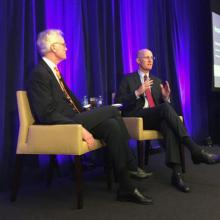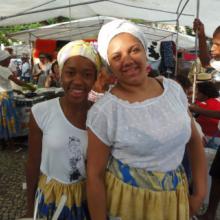Roman Catholics
Father Benigno Palilla, an exorcist for the diocese of Palermo, told Vatican Radio in February that he had performed about 50 exorcisms in the past two and a half years.
Critical to the success of the movement is the fact that corporations are not simply tolerating activists such as Daly.
Instead, they increasingly see the socially responsible agenda as good business; and, perhaps more important, so do investment firms that are responding to the growing demand for portfolios that reflect a client’s values while also making money as effectively as any other investment.
During our nearly 40 years of friendship, I led several interreligious missions with Keeler, including meetings with then-Pope John Paul II at the Vatican. We co-led trips to Israel, including a visit to a civilian bomb shelter, and a poignant painful pilgrimage to the infamous death camps of Auschwitz-Birkenau.
Sometimes public figures can seem distant and impersonal, but that was never the case with the always gracious and welcoming Keeler.
Even by this pope’s standards it was a bold move.
Francis, the spiritual leader of more than a billion Roman Catholics across the globe, this week traveled to Sweden, one of the most secularized countries in Europe, to take part in events marking 500 years since Martin Luther kickstarted the Protestant Reformation.
This Nov. 2, on what is known as All Souls’ Day, Roman Catholics around the world will be praying for loved ones who have died and for all those who have passed from this life to the next. They will be joined by Jerry Walls.
“I got no problem praying for the dead,” Walls says without hesitation — which is unusual for a United Methodist who attends an Anglican church and teaches Christian philosophy at Houston Baptist University.
Most Protestant traditions forcefully rejected the “Romish doctrine” of purgatory after the Reformation nearly 500 years ago. The Protestant discomfort with purgatory hasn’t eased much since: You still can’t find the word in the Bible, critics say, and the idea that you can pray anyone who has died into paradise smacks of salvation by good works.
The dead are either in heaven or hell, they say. There’s no middle ground, and certainly nothing the living can do to change it.
Many Catholics don’t seem to take purgatory as seriously as they once did, either, viewing it as fodder for jokes or as the “anteroom of heaven,” an unpleasant way station that is only marginally more appealing than hell.
But Walls is a leading exponent of an effort to convince Protestants — and maybe a few Catholics — that purgatory is a teaching they can, and should, embrace. And he’s having a degree of success, even among some evangelicals, that hasn’t been seen in, well, centuries.
In his first Advent address, Pope Francis directed Christians to be guided by the “Magnificat,” Mary’s song of praise for the coming Christ child. She proclaims that God has “lifted up the lowly and filled the hungry with good things” (Luke 1:52-53). This past Tuesday, Pope Francis heeded his own exhortation by releasing a video message calling for an end to hunger as part of a worldwide “wave of prayer.”
Hundreds of Christian organizations across the globe participated in the “wave of prayer,” which was organized by Caritas International, a confederation of Catholic charities in the Vatican.
“We are in front of a global scandal of around 1 billion people who still suffer from hunger today,” Pope Francis said in his message. “We cannot look the other way.” The wave began at noon on the Pacific island of Samoa and proceeded west with people of faith from each subsequent time zone participating at noon their time.
The couple practiced Candomble, an African-Brazilian faith with roots in Brazil’s slave trade.
They dressed in white and believed in an all-powerful God who is served by lesser deities, blending Catholicism with African spiritualism, or the belief that the dead communicate with the living.
But their neighbor, who attended a local evangelical church, disapproved. On a balmy day one year ago he shot and killed the husband as he was screwing in a light bulb in his yard.






